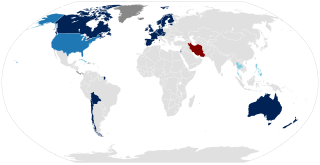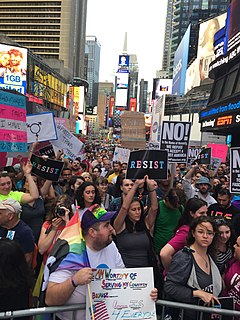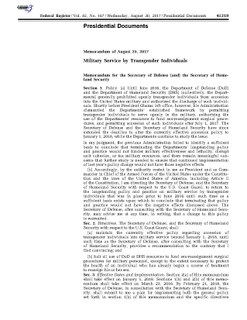Lesbian, gay, bisexual, transgender, and queer (LGBTQ) personnel are able to serve in the armed forces of some countries around the world: the vast majority of industrialized, Western countries, in addition to South Africa, and Israel. The rights concerning intersex people are more vague.
{{Infobox LGBT rights | location_header = the U.S. | image = USA orthographic.svg | caption = United States | legal_status = Legal nationwide since 2003
(Lawrence v. Texas) Legal in some areas since 1962 | gender_identity_expression = Laws vary by jurisdiction | recognition_of_relationships = Same-sex marriage is legal nationwide since 2015 except American Samoa and some tribal nations
(Obergefell v. Hodges) Recognized by the federal government since 2013
(United States v. Windsor). | adoption = Legal in 50 states since 2016 | military = Sexual orientation: Yes
Gender identity: Yes "Don't ask, don't tell" policy repealed on September 20, 2011 [[Directive-type Memorandum-19-004 Under President Biden, Transgender Individuals may now serve in The U.S. military since Jan 20, 2021 | discrimination_protections = Sexual orientation and gender identity in employment nationwide since June 2020, as a result of Bostock v. Clayton County and Harris Funeral Homes v. EEOC .
Laws vary by jurisdiction, but most states lack protections against LGBT discrimination outside of employment. Federal protections are proposed under the Equality Act. }} Lesbian, gay, bisexual and transgender (LGBT) rights in the United States have evolved in recent decades. However, LGBT Americans may still face some legal and social challenges not experienced by non-LGBT residents, particularly in states with large conservative populations, such as in the Deep South and in much of the Midwest; in rural areas; and in some Native American tribal nations.
Transgender rights in the United States vary considerably by jurisdiction as the Supreme Court of the United States (SCOTUS) has only once ruled directly on transgender rights, in 2020; regarding the applicability of Title VII of the Civil Rights Act 1964, in the case of R.G. & G.R. Harris Funeral Homes Inc. v. Equal Employment Opportunity Commission, SCOTUS held that Title VII protections on sex discrimination in Employment extend to Transgender Employees.

Not all armed forces have policies explicitly permitting LGBT personnel. Generally speaking, Western European militaries show a greater tendency toward inclusion of LGBT individuals. As of January 2021, 20 countries allow transgender military personnel to serve openly: Australia, Austria, Belgium, Bolivia, Canada, Chile, Czechia, Denmark, Estonia, Finland, France, Germany, Ireland, Israel, Netherlands, New Zealand, Norway, Spain, Sweden, and the United Kingdom. Cuba and Thailand reportedly allowed transgender service in a limited capacity. In 1974, the Netherlands was the first country to allow transgender military personnel.

There have been women in the United States Army since the Revolutionary War, and women continue to serve in it today. As of fiscal year 2014, women are approximately 14 percent of the active duty Army, 23 percent of the Army Reserve, and 16 percent of the Army National Guard.

There have been women in the United States Marines since 1918, and women continue to serve in it today. As of 2016, women make up 8% of all active enlisted Marines, and 7.5% of active Officers. These numbers give the Marine Corps the lowest ratio of women in all of the U.S military branches. Women's presence in the Marine Corps first emerged in 1918 when they were permitted to do administrative work in an attempt to fill the spots of male Marines fighting overseas. It was not until 1948 that women were able to become a permanent part of the Corps with the passing of the Women's Armed Services Integration Act. However, even with the Integration Act, women were still banned from certain military occupation specialties. It was not until 2016 that Defense Secretary Ash Carter announced that all military occupations would be open to women without exception. As of 2018, there were 18 women serving in the Marine Corps combat arms. On December 14, 2020, the Marine Corps Recruit Depot San Diego agreed to join the Marine Corps Recruit Depot Parris Island in accepting female recruits, with 60 female recruits are scheduled to begin training at the San Diego depot in February 2021.

There have been women in the United States Air Force since 1948, and women continue to serve in it today.

This is an article about the social policy of Donald Trump prior to and during his presidency.
This article addresses the legal and regulatory history of transgender and transsexual people in the United States including case law and governmental regulatory action affecting their legal status and privileges, at the federal, state, municipal, and local level, and including military justice as well.

Because of the 2020 version of DoD Instruction 1300.28 transgender personnel in the United States military are denied equal opportunity to serve or enlist in the United States military, except if they serve in their original sex assignment, had been grandfathered in prior to April 12, 2019, or were given a waiver. This Memorandum, originally scheduled to expire on March 12, 2020, was extended until September 12, 2020. Before it expired, it was replaced by a reissued version of DoD Instruction 1300.28, “Military Service by Transgender Persons and Persons with Gender Dysphoria," which took effect on September 4, 2020.

Stone v. Trump (1:17-cv-02459-MJG) is a lawsuit filed on August 28, 2017 in the United States District Court for the District of Maryland. The lawsuit alleges that President Donald Trump's ban on transgender personnel joining the U.S. military violates their equal protection and due process rights. The American Civil Liberties Union (ACLU) of Maryland filed the suit on behalf of Petty Officer First Class Brock Stone, an 11-year veteran of the U.S. Navy, and several other transgender service members. In addition to President Trump, the suit names as defendants the Secretaries of Defense, the Army, the Navy, and the Air Force.

The Presidential Memorandum on Military Service by Transgender Individuals, officially the Presidential Memorandum for the Secretary of Defense and the Secretary of Homeland Security is the 27th presidential memorandum signed by U.S. President Donald Trump on August 25, 2017. The intent was to prevent transgender people from serving in the U.S. military. Federal courts delayed the implementation of this rule by issuing four injunctions. On January 22, 2019, however, the U.S. Supreme Court allowed the Trump administration's ban to take effect.

In the past most lesbian, gay, bisexual, transgender, and queer (LGBTQ) personnel had major restrictions placed on them in terms of service in the United States military. As of 2010 sexual orientation and gender identity in the United States military varies greatly as the United States Armed Forces have become increasingly openly diverse in the regards of LGBTQ people and acceptance towards them.

Jane Doe v. Trump (1:17-cv-01597-CKK) was a lawsuit filed on August 9, 2017 and decided January 4, 2019 in the United States District Court for the District of Columbia. The suit sought to block Donald Trump and top Pentagon officials from implementing the proposed ban on military service for transgender people under the auspices of the equal protection and due process clauses of the Fifth Amendment. The court ruled that the Trump administration's policy should not be blocked. Nonetheless, the Trump administration's policy continued to be blocked due to three preliminary injunctions against it that were not part of this lawsuit and which remained in effect as of the lawsuit's conclusion on January 4, 2019.

Stockman v. Trump (5:17-cv-01799-JGB-KKx) is an old lawsuit filed on September 5, 2017, in the United States District Court for the Central District of California. The suit, like the similar prior suits Jane Doe v. Trump, Stone v. Trump, and Karnoski v. Trump, seeks to block Trump and top Pentagon officials from implementing the proposed ban on military service for transgender people under the auspices of the equal protection and due process clauses of the Fifth Amendment. The suit was filed on the behalf of four named and three anonymous transgender plaintiffs by Equality California (EQCA). Two other major LGBT-rights organizations which had filed Jane Doe v. Trump, GLBTQ Legal Advocates & Defenders (GLAD) and the National Center for Lesbian Rights, joined the suit as co-counsels in October 2017.

Karnoski v. Trump (2:17-cv-01297-MJP) is a lawsuit filed on August 29, 2017 in the United States District Court for the Western District of Washington. The suit, like the similar suits Jane Doe v. Trump, Stone v. Trump, and Stockman v. Trump, seeks to block Trump and top Pentagon officials from implementing the proposed ban on military service for transgender people under the auspices of the equal protection and due process clauses of the Fifth Amendment. The suit was filed on the behalf of three transgender plaintiffs, the Human Rights Campaign, and the Gender Justice League by Lambda Legal and OutServe-SLDN.
The Presidential Memorandum for the Secretary of Defense and the Secretary of Homeland Security Regarding Military Service by Transgender Individuals is the 43rd presidential memorandum signed by U.S. President Donald Trump on March 23, 2018.

The Trump trans soldier exclusion took effect with the Directive-type Memorandum-19-004 signed by David L. Norquist of the United States Department of Defense. The DTM banned most transgender individuals from serving or enlisting in the United States Armed Forces and applied to all organizational entities in the United States Department of Defense and the United States Coast Guard.
The Presidential Memorandum on Military Service by Transgender Individuals may refer to:












